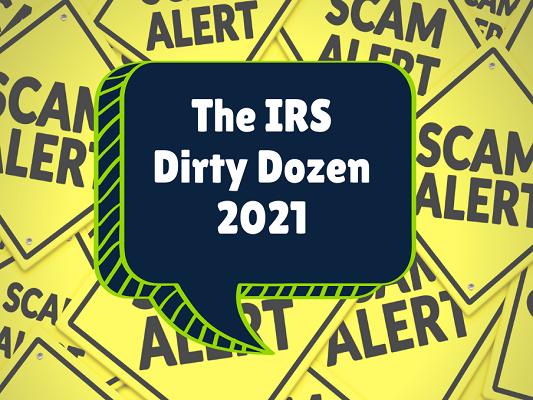|
As Amy Kleinschmit, DakCU's Chief Compliance Officer mentioned in her Compliance Update last Friday, the Internal Revenue Service has released its "Dirty Dozen" list for 2021 with a warning for taxpayers, tax professionals and financial institutions to be on the lookout for these 12 nefarious schemes and scams. This year's "Dirty Dozen" will be separated into four separate categories:
The IRS urges all taxpayers to be on guard, especially during the pandemic, not only for themselves, but also for other people in their lives. "We continue to see scam artists use the pandemic to steal money and information from honest taxpayers in a time of crisis," said IRS Commissioner Chuck Rettig. "We provide this list to alert taxpayers about common scams that fraudsters use against their victims. At the IRS, we are dedicated to stopping these criminals, but it's up to all of us to remain vigilant to protect ourselves and our families." Taxpayers are encouraged to review the "Dirty Dozen: list in a special section on IRS.gov and should be alert to these scams during tax filing season and throughout the year. Economic Impact Payment theft A continuing threat to individuals is from identity thieves who try to steal Economic Impact Payments (EIPs), also known as stimulus payments. Most eligible people will get their payments automatically from the IRS. Taxpayers should watch out for these tell-tale signs of a scam:
Unemployment fraud leading to inaccurate taxpayer 1099-Gs Because of the COVID-19 pandemic, many taxpayers lost their jobs and received unemployment compensation from their state. However, scammers also took advantage of the pandemic by filing fraudulent claims for unemployment compensation using stolen personal information of individuals who had not filed claims. Payments made on these fraudulent claims went to the identity thieves. The IRS reminds taxpayers to be on the lookout for receiving a Form 1099-G reporting unemployment compensation that they didn't receive. For people in this situation, the IRS urges them to contact their appropriate state agency for a corrected form. If a corrected form cannot be obtained so that a taxpayer can file a timely tax return, taxpayers should complete their return claiming only the unemployment compensation and other income they actually received. See Identity Theft and Unemployment Benefits for tax details and DOL.gov/fraud for state-by-state reporting information. Additional protection to help protect taxpayers To help taxpayers avoid identity theft, the IRS this year made its Identity Protection PIN (IP PIN) program available to all taxpayers. Previously it was available only to victims of ID theft or taxpayers in certain states. The IP PIN is a six-digit code known only to the taxpayer and to the IRS. It helps prevent identity thieves from filing fraudulent tax returns using a taxpayer's personally identifiable information. Using an IP PIN is, in essence, a way to lock a tax account. The IP PIN serves as the key to opening that account. Electronic returns that do not contain the correct IP PIN will be rejected and paper returns will go through additional scrutiny for fraud. Reducing fraud. The IRS and its Security Summit partners in the states and the private-sector tax community have made changes to help reduce identity theft-related refund fraud that are noticeable to the average person filing a return:
Multi-factor authentication can help. It is important for taxpayers filing in 2021 to know that online tax software products available to both taxpayers and tax professionals will contain options for multi-factor authentication. Multi-factor authentication allows users to better protect online accounts. One way this is accomplished is by requiring a security code sent to a mobile phone in addition to the username and password used to access the account. The IRS and its Security Summit partners have formed an information sharing center that allows them to quickly identify emerging scams and react to protect taxpayers. The Identity Theft Tax Refund Fraud Information Sharing and Analysis Center PDF is now operational. Also, check out our recent A Closer Look column for more on how to be vigilant about tax scams. Visit Identity Theft Central and Tax Fraud Alerts for more information on how to protect against or report identity theft or fraud. Comments are closed.
|
The MemoThe Memo is DakCU's newsletter that keeps Want the Memo delivered straight to your inbox?
Archives
July 2024
Categories
All
|
|
Copyright Dakota Credit Union Association. All Rights Reserved.
2005 N Kavaney Dr - Suite 201 | Bismarck, North Dakota 58501 Phone: 800-279-6328 | [email protected] | sitemap | privacy policy |





